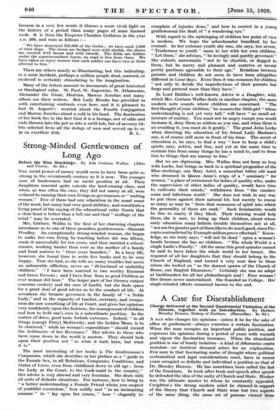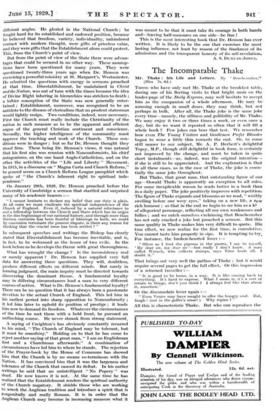A Case for Disestablishment
Charge delivered at the Second Quadrennial Visitation of the Diocese, together with an Introduction. By Herbert Hensley Henson, Bishop of Durham. (Macmillan. 4s. Od.)
A MAN who changes his opinions—Unless it be for the sake of office or preferment—always exercises a certain fascination. When the man occupies an important public position, and expresses his opinions during a period of years with warmth and vigour the fascination increases. When the abandoned position is one of lonely isolationa kind of Athanasius contra mundum—an insistent demand arises for an explanation. Few men in that fascinating realm of thought where political ecclesiastical and legal considerations meet, have in recent years occupied so definite and individual a position as that of Dr. Hensley Henson. He has sometimes been called the last of the Erastians. In book after book and speech after speech he defended the idea of the unity of Church and State. Hooker was the ultimate master to Whom he constantly appealed, Creighton's the strong modem mind he claimed in support of the theory that Church and State were but two aspects - of the same thing,- the same set of persons viewed from
different angles. He gloried in the • National Church ; he fought hard for its established and endowed position, because he believed that freedom, variety, individuality, unhindered
contact- with modern thought, were gifts of priceless value, and they were gifts that the Establishment alone could protect. This, from the Church's point of view.
But from the point of view of the State there were advan. tages that could be secured in no other way. These assump- tions have been questioned for many years. They were questioned twenty-three years ago when Dr. Henson was exercising a powerful ministry at St. Margaret's, Westminster.' He rebutted the questions with energy in sermons preached- at that time. Disestablishment, he maintained in Christ and the Nation, was out of tune with the times becausethe idea
of Divine Right inhering in hierarchies was stricken to death ; a loftier conception of the State was now generally enter- tained ; Establishment, moreover, was recognized to be an' antidote to the disease of clericalism that no prudent statesman would lightly resign. Two conditions, indeed, were necessary. First the Church must really include the Christianity of the nation in such measure as to be the apparent and efficient organ of the general Christian sentiment and conscience.• Secondly, the higher intelligence of ' the community must approve the teaching and work of the Church. These con- ditions were in danger ; but so far Dr. Henson thought they
stood firm. These being Dr. Henson's views,- it was natural that his first aim was reunion with Nonconformists, his chief
antagonisms, on the one hand Anglo-Catholicism, and on the other the activities of the " Life and Liberty " Movement.
In 1915, in a discourse on " Magna Carta and Church Reform," he poured scorn on a Church Reform League pamphlet whi..ch spoke of " the Church's inherent right to spiritual inde- pendence."
On January 29th, 1928, Dr. Henson preached before the University of Cambridge a sermon that startled and surprised many of his academic hearers :—
" I cannot hesitate to declare my belief that our duty is plain. At all costs we must vindicate the spiritual independence of the Church of England. Even if, induced by a natural reluctance to end a fellowship between the Church and State which has its origin. in the dim beginnings of our national history, and through more than thirteen centuries has been fruitful of blessings to both, we could by concession terminate the present dispute, is there any reason for. thinking that the crucial issue has been settled ? "
In subsequent speeches and writings the Bishop has clearly stated that Disestablishment has become inevitable, and is, in fact, to be welcomed as the, lesser of two evils. In the book before us he develops the theme with great thoroughness.
What has wrought the change ? Is the inconsistency real or merely apparent ? Dr. Henson has supplied very full data for .answering these questions. They will, doubtless, produce different effects on different minds. But surely in forming judgment, the main inquiry must be directed towards discovering the dominant theme. A fundamental loyalty
may in differing circumstances lead a man to very different courses of action. What is Dr. Henson's fundamental loyalty?-
There can be no question that it has always been a passionate devotion to the actual Church of England. This led him in his earliest period into sharp opposition to Nonconformity ; it led him later to uphold its position of prestige ; it leads him now to demand its freedom. Whatever the circumstances of the time he met them with a bold front, he pursued an unflinching course. He never shrank from strong statement.
A saying of Creighton's has obviously constantly recurred to his mind, " The Church of England may be tolerant, but
it must be something." Holding on to that he has come to reject another saying of that great man, " I am an Englishman
first and a Churclunan afterwards." A combination of circumstances have led him to where he stands. The rejection. of the Prayer-book by the House of Commons has showed him that the Church is by no means co-terminus with the Nation. It has convinced him that it was the largeness and- tolerance of the Church that caused its defeat. In his earlier writings he said that an unintelligent "No Popery" was dead. He now knows it is not. At the same time he has realized that the Establishment renders the spiritual authority of the Church nugatory. It shields those who are working to wreck the Anglican tradition and introduce a spirit that is congenitally. and really Roman. It is in order that the Anglican Church may become in increasing measure what it
was meant to be that it must take its courage in both hands and—leaving half-measures on one side—be free !
This is the most interesting book that Dr. Henson has ever written. It is likely to be the one that exercises the most lasting influence, not least by reason of the frankness of its admissions and the transparent honesty of its self-revelation.
A. S. DUNCAN-JONES.







































 Previous page
Previous page